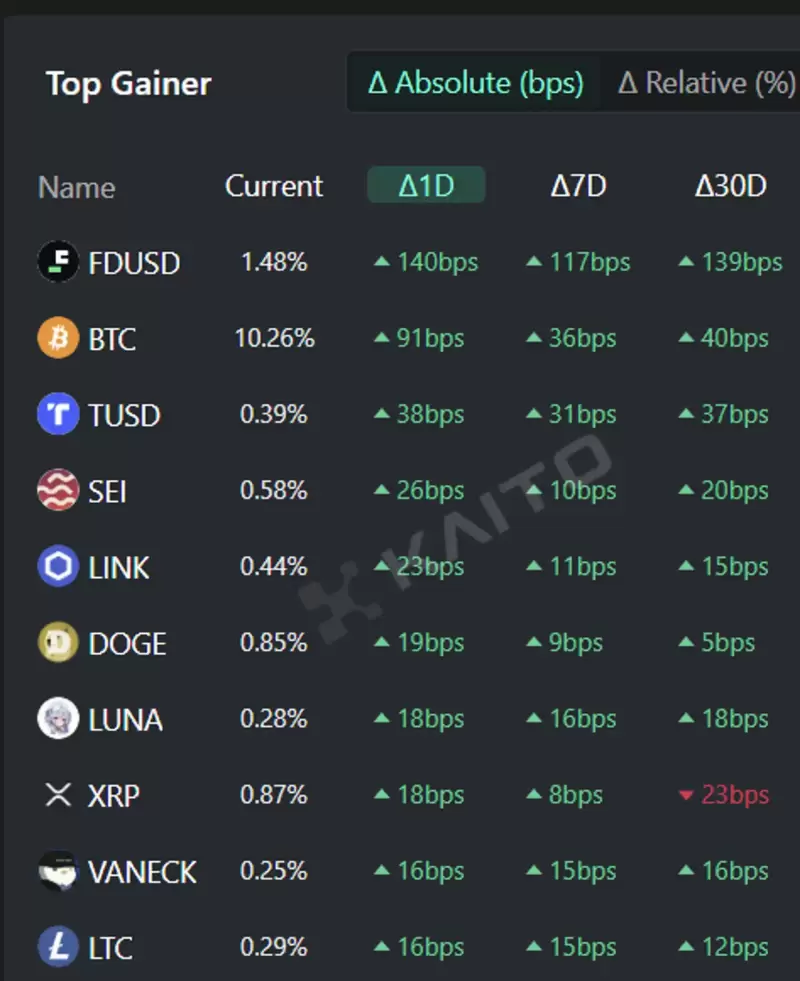 |
|
 |
|
 |
|
 |
|
 |
|
 |
|
 |
|
 |
|
 |
|
 |
|
 |
|
 |
|
 |
|
 |
|
 |
|
正統的創投永遠不會為去中心化人工智慧提供資源來挑戰微軟、Alphabet、蘋果等公司。去中心化人工智慧協會主席 Michael J. Casey 表示,唯一的方法是用用戶擁有的、基於代幣的系統取代股權融資。

The six most heavily capitalized companies in the U.S. are engaged in a spending war as each tries to outrace the others toward artificial intelligence (AI) supremacy.
美國資本最雄厚的六家公司正捲入一場支出戰,每一家公司都試圖超越其他公司,爭奪人工智慧 (AI) 的霸主地位。
Together, Microsoft, Alphabet, Apple, Meta, Amazon and Nvidia are booking $1.8 trillion in annual revenues, a number that would put their combined inflows in 10th place of global country rankings if we viewed them as a proxy for national gross domestic product (GDP) – just behind the gross output of Brazil's 220 million people.
微軟、Alphabet、蘋果、Meta、亞馬遜和英偉達的年收入合計為1.8 兆美元,如果我們將它們視為國家國內生產毛額(GDP) 的代表,那麼這些企業的總流入量將在全球國家排名中位列第10 位。
Meanwhile, The Six have a combined market capitalization of $15 trillion, capturing an astounding one third of the entire S&P 500 index.
與此同時,六大公司的總市值達到 15 兆美元,佔據了整個標準普爾 500 指數的驚人三分之一。
Despite – or perhaps because of – this unprecedented scorecard, these companies are relentlessly competing for world domination. Doing what great American companies have always done, they’re unleashing a competitive instinct that, in a normal capitalist economy of diversified goods and services, is the core driver of technological progress.
儘管——或者或許正是因為——這種史無前例的記分卡,這些公司仍在不懈地爭奪世界統治地位。他們正在做偉大的美國公司一直以來所做的事情,釋放競爭本能,在商品和服務多樣化的正常資本主義經濟中,競爭本能是技術進步的核心驅動力。
So, don’t worry about The Six. Worry about us.
所以,不用擔心六人組。擔心我們。
Because our problem amid the dizzying advance of AI is definitely not one of a shortfall in technological progress. It’s that this particular form of technological progress comes with risks to human autonomy and safety. And to mitigate them, the question of who controls AI’s development and whether their incentives are aligned with the broadest base of humanity is fundamental.
因為在人工智慧的快速發展中,我們的問題絕對不是技術進步的不足。這種特殊形式的技術進步會為人類的自主性和安全帶來風險。為了緩解這些問題,誰控制人工智慧的發展以及他們的激勵措施是否符合最廣泛的人類基礎的問題至關重要。
Just as was the case for Alphabet’s Google, Meta’s Facebook and Amazon’s marketplace, the development of these six companies’ large language models (LLMs) and other AI machinery is occurring within closed, black-box systems.
正如 Alphabet 的Google、Meta 的 Facebook 和亞馬遜的市場的情況一樣,這六家公司的大型語言模型 (LLM) 和其他人工智慧機制的開發都是在封閉的黑盒子系統內進行的。
They’ve ingested the troves of data we all unwittingly poured into internet sites, and have built highly complex codebases into which no one has visibility. Between them, they dominate all layers of the AI stack: the storage (Amazon Web Services), the chips for computation (Nvidia), the AI models (Microsoft, with its investment in Open AI), the data (Alphabet and Meta) and the devices we use to interact with AI services (Apple).
他們吸收了我們無意中倒入網路網站的大量數據,並建立了無人能見的高度複雜的程式碼庫。它們主導著人工智慧堆疊的所有層:儲存(亞馬遜網路服務)、計算晶片(Nvidia)、人工智慧模型(微軟,投資開放人工智慧)、資料(Alphabet 和 Meta)和我們用來與人工智慧服務交互的裝置(Apple)。
They might be competing with each other, but they form a vertically diversified oligopoly. Or rather, given the undeniable power that their technology can wield over people’s lives, they’re an oligarchy. Indeed, the secrecy around the means by which they exercise that power is characteristic of most oligarchical dictatorships.
它們可能相互競爭,但它們形成了垂直多元化的寡占。或者更確切地說,鑑於他們的技術可以對人們的生活發揮不可否認的力量,他們是寡頭政治。事實上,對他們行使權力的方式進行保密是大多數寡頭獨裁政權的特徵。
Toward the latter phase of the Web2 era, people eventually came to understand Bruce Schneier’s memorable observation that we are not the internet platforms’ customers; we are their products. With that awareness, we’re now also finally opening our eyes to how these companies have long been incentivized to modify people’s behavior in unhealthy ways to maximize shareholder returns.
在 Web2 時代的後期,人們最終開始理解 Bruce Schneier 的令人難忘的觀察:我們不是網路平台的客戶;我們是網路平台的客戶。我們是他們的產品。有了這種認識,我們現在終於開始關注這些公司長期以來如何被激勵以不健康的方式改變人們的行為,以實現股東回報最大化。
It is no longer controversial to talk of the psychological harm done by the algorithms of Facebook, YouTube, Tik Tok and their ilk, which were blatantly designed to exploit dopamine releases to encourage continued, addictive engagement.
談論 Facebook、YouTube、Tik Tok 等演算法造成的心理傷害已不再是有爭議的事情,這些演算法公然旨在利用多巴胺釋放來鼓勵持續的、令人上癮的參與。
When Frank McCourt and I published Our Biggest Fight in March 2024, we were overwhelmed by parents’ horror stories of the harm social media had done to their kids. And then a Harris Poll coordinated by NYU Professor Johathan Haidt found that young people are just as concerned: nearly half of Gen Z wishes that TikTok and X (Twitter) never existed, even as 83% of the same cohort said they spend four hours a day or more on social media.
當弗蘭克麥考特和我於 2024 年 3 月出版《我們最大的鬥爭》時,我們對父母講述社交媒體對孩子造成的傷害的恐怖故事感到不知所措。然後,由紐約大學教授Johathan Haidt 協調的哈里斯民意調查發現,年輕人也有同樣的擔憂:近一半的Z 世代希望TikTok 和X (Twitter) 從未存在過,儘管同一群體中83% 的人表示他們每天花四小時在社群媒體上停留一天或更長時間。
So, if we now know of the harms, why on earth would we extend the same oligopolistic control structure into the AI era? AI will put the Web2 oligopoly on steroids.
那麼,如果我們現在知道了這些危害,我們到底為什麼要把同樣的寡占控制結構延伸到人工智慧時代呢?人工智慧將使 Web2 寡占地位進一步增強。
This is why I believe the creation of distributed, collectively owned open-source AI is a vitally important use case for Web3 and blockchain technology. It’s the only way to avoid the problem of misaligned incentives.
這就是為什麼我相信創建分散式、集體所有的開源人工智慧是 Web3 和區塊鏈技術的一個極其重要的用例。這是避免激勵失調問題的唯一方法。
Sure, there are technical challenges, such as the latency that, for now, makes distributed machine learning inefficient, the capacity limits of on-chain data, or the privacy risks inherent to public blockchains. But innovators are already hard at work on outside-the-box solutions to these problems, motivated by the huge economic and reputational payoff promised by overcoming them. And when they do, the inherent information advantages enjoyed by open systems over closed systems will give decentralized AI a fighting chance. Achieve that, and “DeAI” will represent not only the right moral path but also the economic winner.
當然,存在技術挑戰,例如目前導致分散式機器學習效率低下的延遲、鏈上資料的容量限製或公共區塊鏈固有的隱私風險。但創新者已經在努力尋找解決這些問題的創新解決方案,克服這些問題所帶來的巨大經濟和聲譽回報是他們的動力。當他們這樣做時,開放系統相對於封閉系統所享有的固有資訊優勢將為去中心化人工智慧提供戰鬥機會。要實現這一點,「DeAI」不僅代表了正確的道德道路,也代表了經濟贏家。
Here’s the rub: time is not on our side. And the fight is heavily lopsided. As cited above, The Six have an unprecedented $15 trillion war chest.
問題是:時間不在我們這邊。而且戰鬥嚴重一邊倒。如上所述,六人組擁有前所未有的 15 兆美元戰爭資金。
In the 2000s, Facebook and Google learned that their high-value share prices gave them a currency with which to relentlessly acquire startups that could either enhance or threaten their dominance. Now, The Six have even greater capacity to buy up and integrate whatever breakthroughs in AI are coming, be it in independent AI agents or more efficient systems of compute
2000 年代,Facebook 和Google了解到,它們的高價值股價為它們提供了一種貨幣,可以用來不斷收購可能增強或威脅它們主導地位的新創公司。現在,六人組擁有更大的能力來購買和整合即將到來的人工智慧突破,無論是獨立的人工智慧代理商還是更有效率的運算系統
免責聲明:info@kdj.com
所提供的資訊並非交易建議。 kDJ.com對任何基於本文提供的資訊進行的投資不承擔任何責任。加密貨幣波動性較大,建議您充分研究後謹慎投資!
如果您認為本網站使用的內容侵犯了您的版權,請立即聯絡我們(info@kdj.com),我們將及時刪除。
-

-

-

-

- 失去關鍵支持水平後,Pepe(Mind)價格下跌超過15%
- 2025-04-03 15:50:12
- PEPE價格在每週的時間範圍內下跌超過16%,此前24小時下跌5%,價格為$ 0.000007173
-

-

-

-

- Dogecoin(Doge)價格預測:一位分析師強調了看漲的分歧,表明可能會有集會
- 2025-04-03 15:40:13
- 一位分析師強調了對Dogecoin的看漲分歧,這表明交易者應該專注於數字而不是新聞。
-

- XRP導航揮發性水域,針對其範圍的突破
- 2025-04-03 15:35:27
- Ripple的XRP正在貫穿一個動蕩的階段,隨著更廣泛的加密市場經歷的湍流,努力保持至關重要的支持水平。




























































